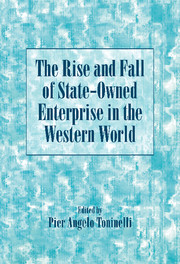Book contents
- Frontmatter
- Contents
- Preface
- Contributors
- PART I SETTING THE STAGE
- PART II NATIONAL CASES
- 5 The Rise and Fall of State-Owned Enterprise in Germany
- 6 Beyond State and Market: Italy's Futile Search for a Third Way
- 7 State Enterprise in Britain in the Twentieth Century
- 8 The Rise and Decline of State-Owned Industry in Twentieth-Century France
- 9 The Rise and Decline of Spanish State-Owned Firms
- 10 Fifty Years of State-Owned Industry in Austria, 1946–1996
- 11 A Reluctant State and Its Enterprises: State-Owned Enterprises in the Netherlands in the “Long” Twentieth Century
- 12 State-Owned Enterprises in a Hostile Environment: The U.S. Experience
- Conclusion: Schumpeter Revisited
- Index
9 - The Rise and Decline of Spanish State-Owned Firms
Published online by Cambridge University Press: 05 December 2011
- Frontmatter
- Contents
- Preface
- Contributors
- PART I SETTING THE STAGE
- PART II NATIONAL CASES
- 5 The Rise and Fall of State-Owned Enterprise in Germany
- 6 Beyond State and Market: Italy's Futile Search for a Third Way
- 7 State Enterprise in Britain in the Twentieth Century
- 8 The Rise and Decline of State-Owned Industry in Twentieth-Century France
- 9 The Rise and Decline of Spanish State-Owned Firms
- 10 Fifty Years of State-Owned Industry in Austria, 1946–1996
- 11 A Reluctant State and Its Enterprises: State-Owned Enterprises in the Netherlands in the “Long” Twentieth Century
- 12 State-Owned Enterprises in a Hostile Environment: The U.S. Experience
- Conclusion: Schumpeter Revisited
- Index
Summary
Before the outbreak of the Spanish Civil War in 1936, there were very few public firms in Spain. Those that existed were closely linked to military activities. Government intervention was focused on the regulation of some markets. The need to raise revenues induced the Primo de Rivera dictatorship to nationalize oil distribution in 1927, but the state monopoly was sold out to a consortium of private interests, mainly banks. Other “fiscal monopolies” existed in tobacco and matches production and distribution. There were a few firms with mixed ownership: CAMPSA and a couple of banks (Banco de Crédito Industrial and Banco Exterior de España). In all these cases the management was private, and the minority partnership of the state meant only that the firm had some duties to this special shareholder. Also during the Primo de Rivera dictatorship, in 1924 a law was passed (Estatuto Municipal) that authorized town councils to create municipally owned firms.
All in all, even taking into account these developments, free enterprise and free domestic markets were the rule. The Civil War was, in this respect as in many others, a watershed event.
In this essay we will concentrate on two issues: the historical development of Spanish state-owned firms and their growth pattern compared with that of the private sector. In the first part, the opening section will outline the great wave of creation of public firms, lasting from 1940 to the end of the 1950s, and their political and economic origins.
- Type
- Chapter
- Information
- The Rise and Fall of State-Owned Enterprise in the Western World , pp. 208 - 236Publisher: Cambridge University PressPrint publication year: 2000
- 4
- Cited by



